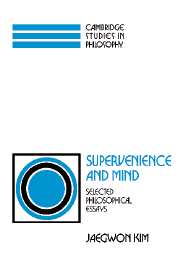Book contents
- Frontmatter
- Contents
- Preface
- Sources
- Part I Events and supervenience
- 1 Causation, nomic subsumption, and the concept of event
- 2 Noncausal connections
- 3 Events as property exemplifications
- 4 Concepts of supervenience
- 5 “Strong” and “global” supervenience revisited
- 6 Epiphenomenal and supervenient causation
- 7 Supervenience for multiple domains
- 8 Supervenience as a philosophical concept
- 9 Postscripts on supervenience
- Part II Mind and mental causation
- Index
3 - Events as property exemplifications
Published online by Cambridge University Press: 28 January 2010
- Frontmatter
- Contents
- Preface
- Sources
- Part I Events and supervenience
- 1 Causation, nomic subsumption, and the concept of event
- 2 Noncausal connections
- 3 Events as property exemplifications
- 4 Concepts of supervenience
- 5 “Strong” and “global” supervenience revisited
- 6 Epiphenomenal and supervenient causation
- 7 Supervenience for multiple domains
- 8 Supervenience as a philosophical concept
- 9 Postscripts on supervenience
- Part II Mind and mental causation
- Index
Summary
The term ‘event’ ordinarily implies change, and most changes are changes in a substance. Whether coming into being and passing away can be construed as changes in substances is a question we shall not consider here. A change in a substance occurs when that substance acquires a property it did not previously have, or loses a property it previously had. Whether fissions and fusions of substances can be considered as cases of losing or acquiring properties is, again, a question we shall not discuss in this paper. By ‘substance’ I mean things like tables, chairs, atoms, living creatures, bits of stuff like water and bronze, and the like; there is no need here to associate this notion with a particular philosophical doctrine about substance.
Besides events, we also speak of “states”. If “events” signal changes,“states” seem to be static things, “unchanges”, to use a term of C. J. Ducasse's; some examples of states would be my body's weighing 140 pounds, the earth's being nearly spherical in shape, and the presence of oxygen in this room. There are, however, good reasons for not taking this dichotomy of changes and unchanges, or of events and states, too seriously at the initial stage of developing a theory of events. For one thing, there are cases that are hard to classify e.g., the whirring of my typewriter, having a throbbing pain in the right elbow.
- Type
- Chapter
- Information
- Supervenience and MindSelected Philosophical Essays, pp. 33 - 52Publisher: Cambridge University PressPrint publication year: 1993
- 18
- Cited by

